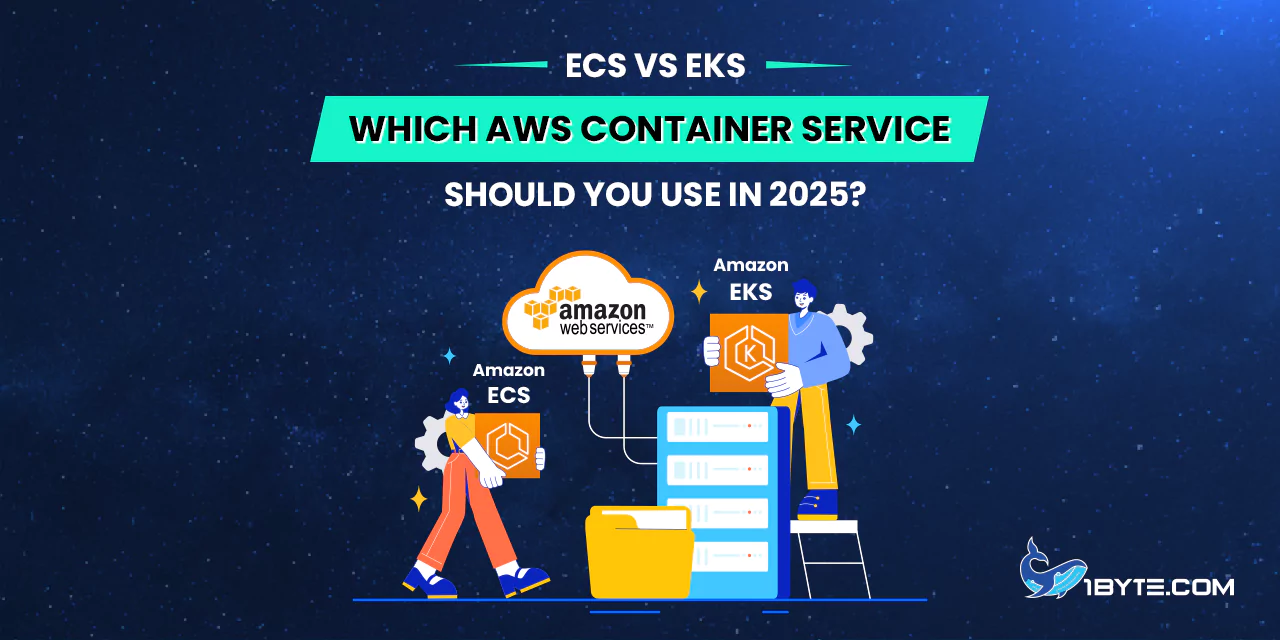Cloud-native adoption is booming, and container orchestration is now mainstream. 93% of companies run Kubernetes in production or are evaluating it. Serverless containers are also rising in popularity – about 46% of container-using organizations now run “serverless” containers (like ECS or EKS on Fargate). This growing demand means AWS’s two managed container services – Amazon ECS (Elastic Container Service) and Amazon EKS (Elastic Kubernetes Service) – are crucial choices for modern applications. Both services scale to massive workloads: for example, ECS ran 77.24 million tasks on Prime Day 2024 (a 23% year-over-year jump), and EKS now supports clusters up to 100,000 nodes. With new 2024–2025 enhancements on both sides, organizations must weigh “ecs vs eks” carefully. This guide from 1Byte compares their features, costs, and use cases to help decide which AWS container service makes sense in 2025.
Amazon ECS: Simplicity and AWS Integration
Amazon ECS is AWS’s native container orchestrator, designed for simplicity. It is fully managed by AWS, so teams do not handle a Kubernetes control plane. AWS notes that ECS “decreases the number of decisions” developers must make about compute, networking, and security. In practice, this means ECS uses AWS-integrated defaults (like automatic use of VPCs and IAM roles) and tools (such as Application Load Balancers) out-of-the-box. Many AWS services use ECS internally (including SageMaker, Polly, Lex, and Batch) and customers like Samsung, GE, and Expedia rely on it.

ECS can run on Amazon EC2 or in AWS Fargate (a serverless mode). Both ECS and EKS offer Fargate, so you pay only for used resources without managing servers=. Fargate support on ECS has grown: in January 2024, AWS added the ability to attach Amazon EBS volumes to ECS Fargate tasks. This brought persistent storage to ECS containers, opening up stateful workloads (databases, file systems) on Fargate. ECS also gained improved observability: AWS announced CloudWatch Container Insights with enhanced observability for ECS (2024), giving deeper visibility and faster troubleshooting.
ECS’s track record shows its scale. As noted above, ECS launched over 77 million tasks during Prime Day 2024. This kind of capacity highlights ECS’s ability to handle sudden spikes and huge workloads. In general, ECS is a good fit when teams want a managed, AWS-opinionated solution. It works especially well for microservices built entirely on AWS, or for organizations happy to use AWS’s container and networking patterns without customizing Kubernetes.
FURTHER READING: |
| 1. AWS Cost Optimization Services: Top 5 Providers in 2025 |
| 2. AWS Indonesia: How to Optimize Your Cloud Services |
| 3. AWS Singapore: Unlocking the Potential of Cloud for Local Businesses |
Key Points about Amazon ECS
- AWS-Native: Runs on EC2 or Fargate with no separate control plane to manage.
- Ease of use: Reduces setup and config decisions (AWS handles most infrastructure details).
- Fargate support: Offers serverless containers and now supports EBS volumes for persistent storage.
- Integration: Works seamlessly with AWS services (IAM, ALB/NLB, CloudWatch).
- Scale: Proven at AWS scale (77.24M tasks on Prime Day 2024).
- Use cases: Ideal for AWS-centric workloads, simple microservices, or teams without deep Kubernetes expertise.
Amazon EKS: Kubernetes Flexibility and Scale
Amazon EKS delivers Kubernetes as a managed service on AWS. It “provides the flexibility of Kubernetes with the security and resiliency of AWS”. In other words, EKS runs upstream Kubernetes for any container workload, while AWS manages the Kubernetes control plane for you. This appeals to teams that want the power of the Kubernetes ecosystem (services, Helm charts, operators) and portability across clouds, but prefer a managed control plane. EKS is used by many enterprises – Intel, Snap, Intuit, GoDaddy, Fidelity and even Amazon.com – for their production Kubernetes workloads.
EKS also has advanced features for 2025. In late 2024 AWS launched Amazon EKS Hybrid Nodes, allowing on-premises servers or edge devices to join an EKS cluster with the same AWS-managed Kubernetes control plane. This unifies cloud and on-prem Kubernetes under one management plane, which is useful for low-latency or regulatory needs. Also introduced is Amazon EKS Auto Mode, a capability (GA at re:Invent 2024) that automatically handles provisioning of compute, storage, and networking for Kubernetes apps. With Auto Mode, teams can deploy a Kubernetes application with a single command – AWS figures out the right EC2 instances or Fargate, does auto-scaling, and optimizes costs automatically.
EKS’s scalability is exceptional. A mid-2025 announcement highlights that EKS can now support a single cluster with 100,000 worker nodes. That means EKS can manage enormous distributed workloads (for example, massive AI or data processing tasks). EKS also integrates AWS innovations like Karpenter (for cluster autoscaling/cost optimization). The rich Kubernetes ecosystem means you can bring many open-source tools (Prometheus, Istio, etc.) or move existing Kubernetes workloads to EKS.
Key Points about Amazon EKS
- Kubernetes ecosystem: Runs standard Kubernetes (v1.x), enabling use of cloud-native tools and portability.
- Managed control plane: AWS manages master nodes and upgrades, relieving ops burden.
- Hybrid & Cloud: Supports on-prem/edge integration (EKS Hybrid Nodes) and multi-Region deployment.
- Auto Mode: New in 2024, automates cluster setup (compute, networking, autoscaling) so one command can deploy apps.
- Massive scale: Now supports up to 100k nodes in one cluster, suitable for ultra-scale or AI workloads.
- Use cases: Best when Kubernetes expertise is available, or for migrating multi-cloud/containerized workloads that need Kubernetes features.
Key Differences and Cost Considerations

When comparing ecs vs eks, some core differences stand out:
- Complexity & Learning Curve: ECS is simpler and more AWS-centric, while EKS follows upstream Kubernetes. ECS has no separate control plane to manage, whereas EKS is essentially a full Kubernetes cluster (more complex, with a steeper learning curve). Teams with Kubernetes experience may leverage EKS, but smaller teams often prefer ECS’s ease.
- Pricing: The compute cost (EC2 or Fargate) is similar for both, but EKS adds a cluster management fee. EKS charges $0.10 per hour per cluster (~$72/month), while ECS has no per-cluster fee. This can add up if an organization runs many clusters.
- Networking: EKS offers fine-grained Kubernetes networking (custom CNI, pod-level IPs), whereas ECS has simpler networking settings. (In EKS Fargate mode some network features may differ.)
- Ecosystem & Portability: EKS uses Kubernetes APIs, so any Kubernetes-aware tool or skill applies. ECS is proprietary to AWS, but container portability still exists at the application level. AWS notes you “do not need to make an all-in decision” – containers are portable, so switching between ECS and EKS later is possible.
- Serverless and Fargate: Both ECS and EKS support AWS Fargate for serverless containers. In fact, Datadog reports nearly half of organizations now use serverless containers. Using Fargate on ECS or EKS is similar in cost (you pay per CPU/RAM used).
- AWS Features: ECS has deep integration with AWS services (IAM roles per task, CloudWatch, Service Connect). EKS integrates AWS security (IAM Roles for Service Accounts, GuardDuty support) but also uses Kubernetes RBAC and add-ons. Both can be managed with AWS tools (CloudWatch Container Insights, CloudTrail, etc.); AWS even offers GuardDuty Kubernetes auditing for EKS.
Summary of Differences:
- Control Plane: ECS – fully managed, no extra cost; EKS – managed Kubernetes with additional fee.
- Simplicity: ECS – fewer moving parts; EKS – richer features but more complexity.
- Compatibility: ECS – AWS-specific; EKS – standard Kubernetes (runs on-prem or in other clouds too).
- Scaling: Both scale well, but EKS now reaches cluster sizes that ECS was not designed for (100k nodes).
- Ecosystem: EKS taps into CNCF/Kubernetes ecosystem; ECS leverages AWS ecosystem (services and tooling).
Choosing Between ECS and EKS in 2025
No uniformity. Teams are advised to consider the needs: when the team desires a straightforward and AWS-native resolution that requires no maintenance, ECS would often do. EKS is the best option when they require the Kubernetes functionality, can be ported to another system and will readily work in a hybrid or local environment. Economic upsides also count: using several small clusters ECS may be a better choice (no cluster fee). Practically, the organizations can combine the two. AWS stresses that ECS and EKS jointly operate, providing IAM and tools and that container portability implies that it is not a one-way street.
By 2025 the choice usually devolves into the specific needs of an application and team knowledge. Consider a dev team that is AWS-centric and developing stateless microservices where one of the development teams decides to launched in ECS (possibly on Fargate) because of the simplicity and the integrated pricing. A team that is constructing a complex data platform or porting an on-prem Kubernetes workload to the cloud may consider using EKS due to its customizability and scale (particularly in light of the recently released Auto Mode, and 100k node capability).
Ultimately, ecs vs eks is a decision based on context. Both services are improving: ECS added persistent storage on Fargate and better observability in 2024, while EKS gained hybrid clusters and full automation. As of 2025, AWS leads container orchestration (Omdia named AWS a “Leader” for cloud container management), with ECS and EKS offering robust, scalable options. Organizations should assess their project requirements, existing skills, and long-term strategy to choose the right service (or mix of services) for their 2025 cloud roadmap.
Leverage 1Byte’s strong cloud computing expertise to boost your business in a big way
1Byte provides complete domain registration services that include dedicated support staff, educated customer care, reasonable costs, as well as a domain price search tool.
Elevate your online security with 1Byte's SSL Service. Unparalleled protection, seamless integration, and peace of mind for your digital journey.
No matter the cloud server package you pick, you can rely on 1Byte for dependability, privacy, security, and a stress-free experience that is essential for successful businesses.
Choosing us as your shared hosting provider allows you to get excellent value for your money while enjoying the same level of quality and functionality as more expensive options.
Through highly flexible programs, 1Byte's cutting-edge cloud hosting gives great solutions to small and medium-sized businesses faster, more securely, and at reduced costs.
Stay ahead of the competition with 1Byte's innovative WordPress hosting services. Our feature-rich plans and unmatched reliability ensure your website stands out and delivers an unforgettable user experience.
As an official AWS Partner, one of our primary responsibilities is to assist businesses in modernizing their operations and make the most of their journeys to the cloud with AWS.
Conclusion
When it comes to ecs vs eks, the right choice depends on the nature of your workloads, the skills of your team, and your long-term cloud strategy. Both services are strong and their development continues to be extended by new features in 2025. ECS is good when simplicity and close AWS connection is important. EKS, in contrast however, is meant to suit organizations which desire Kubernetes flexibility, portability, and enterprise level-scaling.
At 1Byte, we understand how critical this decision is. As a leading cloud and hosting provider, we have guided businesses through container adoption and cloud-native transformations. With state-of-the-art data centers operating internationally, we deliver reliable infrastructure tailored to the needs of fast-growing startups, established enterprises, and government projects alike. Our work supporting digital platforms with thousands of daily users has shown us firsthand how ECS and EKS perform under different conditions.
With businesses increasingly needing resilient and scalable systems, our mission is to be the trusted partner of bringing cutting edge cloud technologies together with deep expertise in delivering such systems. The decision to use ECS or EKS does not need to be complicated- with our guidance, infrastructure, and support, you will know you are on the right path.

